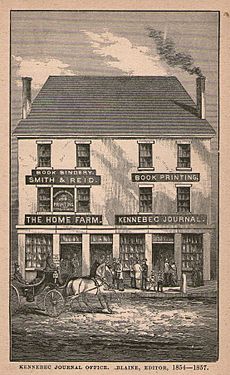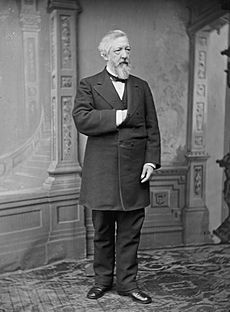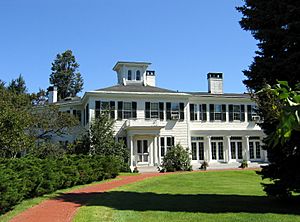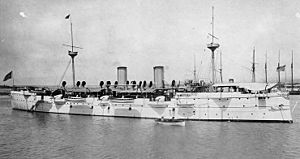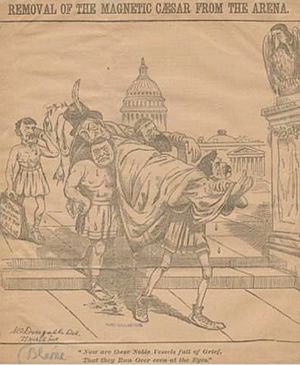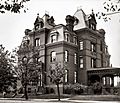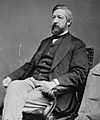James G. Blaine facts for kids
Quick facts for kids
James G. Blaine
|
|
|---|---|
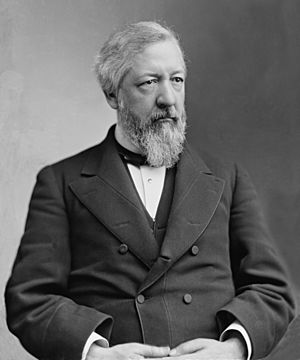
Blaine c. 1870s
|
|
| 28th and 31st United States Secretary of State | |
| In office March 9, 1889 – June 4, 1892 |
|
| President | Benjamin Harrison |
| Preceded by | Thomas F. Bayard |
| Succeeded by | John W. Foster |
| In office March 7, 1881 – December 19, 1881 |
|
| President | James A. Garfield Chester A. Arthur |
| Preceded by | William M. Evarts |
| Succeeded by | Frederick T. Frelinghuysen |
| United States Senator from Maine |
|
| In office July 10, 1876 – March 5, 1881 |
|
| Preceded by | Lot M. Morrill |
| Succeeded by | William P. Frye |
| 27th Speaker of the United States House of Representatives | |
| In office March 4, 1869 – March 3, 1875 |
|
| Preceded by | Theodore Pomeroy |
| Succeeded by | Michael C. Kerr |
| Leader of the House Republican Conference | |
| In office March 4, 1869 – March 3, 1875 |
|
| Preceded by | Theodore M. Pomeroy |
| Succeeded by | Thomas Brackett Reed |
| Member of the U.S. House of Representatives from Maine's 3rd district |
|
| In office March 4, 1863 – July 10, 1876 |
|
| Preceded by | Samuel C. Fessenden |
| Succeeded by | Edwin Flye |
| Personal details | |
| Born |
James Gillespie Blaine
January 31, 1830 West Brownsville, Pennsylvania, U.S. |
| Died | January 27, 1893 (aged 62) Washington, D.C., U.S. |
| Resting place | Blaine Memorial Park, Augusta, Maine |
| Political party | Republican |
| Spouse | Harriet Stanwood |
| Children | 7, including Walker |
| Education | Washington and Jefferson College (BA) |
| Signature | |
James Gillespie Blaine (January 31, 1830 – January 27, 1893) was an American statesman and Republican politician who represented Maine in the United States House of Representatives from 1863 to 1876, serving as Speaker of the U.S. House of Representatives from 1869 to 1875, and then in the United States Senate from 1876 to 1881.
Contents
Early life
James Gillespie Blaine was born January 31, 1830, in West Brownsville, Pennsylvania, the third child of Ephraim Lyon Blaine and his wife Maria (Gillespie) Blaine. Blaine's father was a western Pennsylvania businessman and landowner, and the family lived in relative comfort. Blaine's mother and her forebears were Irish Catholics who immigrated to Pennsylvania in the 1780s. Blaine's parents were married in 1820.
Blaine's biographers describe his childhood as "harmonious," and note that the boy took an early interest in history and literature. At the age of thirteen, Blaine enrolled in his father's alma mater, Washington College (now Washington & Jefferson College), in nearby Washington, Pennsylvania. There, he was a member of the Washington Literary Society, one of the college's debating societies. Blaine succeeded academically, graduating near the top of his class and delivering the salutatory address in June 1847. After graduation, Blaine considered attending Yale Law School, but ultimately decided against it, instead moving west to find a job.
Teacher and publisher
In 1848, Blaine was hired as a professor of mathematics and ancient languages at the Western Military Institute in Georgetown, Kentucky. Although he was only 18 years old and younger than many of his students, Blaine adapted well to his new profession. He made the acquaintance of Harriet Stanwood, a teacher at the nearby Millersburg Female College and native of Maine. On June 30, 1850, the two wed. Blaine once again considered taking up the study of law, but instead took his new bride to visit his family in Pennsylvania. They next lived with Harriet Blaine's family in Augusta, Maine, for several months, where their first child, Stanwood Blaine, was born in 1851. The young family soon moved again, this time to Philadelphia where Blaine took a job at the Pennsylvania Institution for the Instruction of the Blind (now Overbrook School for the Blind) in 1852, teaching science and literature.
Philadelphia's law libraries gave Blaine the chance to at last begin to study the law, but in 1853 he received a more tempting offer: to become editor and co-owner of the Kennebec Journal. He quickly accepted, borrowing the purchase price from his wife's brothers. The decision to become a newspaperman, unexpected as it was, started Blaine on the road to a lifelong career in politics. The newspaper was financially successful, and Blaine was soon able to invest his profits in coal mines in Pennsylvania and Virginia, forming the basis of his future wealth.
Political career
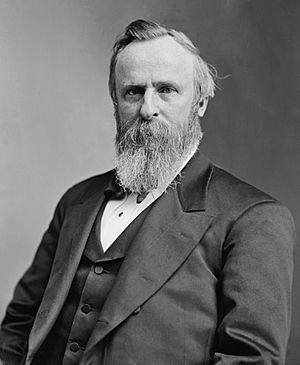
Blaine's career as a Republican newspaperman led naturally to involvement in party politics. He began his political career as an early supporter of Republican Abraham Lincoln and the Union war effort in the American Civil War. In 1858, Blaine ran for a seat in the Maine House of Representatives, and was elected. He ran for reelection in 1859, 1860, and 1861, and was successful each time by large majorities. The added responsibilities led Blaine to reduce his duties with the Advertiser in 1860, and he soon ceased editorial work altogether.
Nicknamed "the Magnetic Man", he was a charismatic speaker in an era that prized oratory. In March 1869, when Speaker Schuyler Colfax resigned from office at the end of the 40th Congress to become vice president, the highly regarded Blaine was the unanimous choice of the Republican Congressional Caucus to become Speaker of the House for the 41st Congress. In the subsequent March 4, 1869, election for Speaker, Blaine easily defeated Democrat Michael C. Kerr of Indiana by a vote of 135 to 57. Republicans remained in control of the House in the 42nd and 43rd congresses, and Blaine was re-elected as speaker at the start of both of them. His time as speaker came to an end following the 1874-75 elections which produced a Democratic majority in the House for the 44th Congress.
Blaine was an effective Speaker with a magnetic personality. President Ulysses S. Grant valued his skill and loyalty in leading the House. He enjoyed the job and made his presence in Washington more permanent by buying a large residence on Fifteenth Street in the city. At the same time, the Blaine family moved to a mansion in Augusta.
During Blaine's six-year tenure as Speaker his popularity continued to grow, and Republicans dissatisfied with Grant mentioned Blaine as a potential presidential candidate prior to the 1872 Republican National Convention. Instead, Blaine worked steadfastly for Grant's re-election. Blaine's growing fame brought growing opposition from the Democrats, as well, and during the 1872 campaign he was accused of receiving bribes in the Crédit Mobilier scandal. Blaine denied any part in the scandal. No one was able to satisfactorily prove Blaine's involvement. Though no evidence of corruption ever surfaced from these allegations, they nevertheless plagued his 1884 presidential candidacy.
United States Senate, 1876–1881
Blaine was appointed to the Senate on July 10, 1876, but did not begin his duties there until the Senate convened in December of that year. While in the Senate, he served on the Appropriations Committee and held the chairmanship of the Committee on Civil Service and Retrenchment, but he never achieved the role of leadership that he had held as a member of the House.
His time in the Senate allowed Blaine to develop his foreign policy ideas. He advocated expansion of the American navy and merchant marine, which had been in decline since the Civil War. Blaine also bitterly opposed the results of the arbitration with Great Britain over American fishermen's right to fish in Canadian waters, which resulted in a $5.5 million award to Britain. Blaine's Anglophobia combined with his support of high tariffs. He had initially opposed a reciprocity treaty with Canada that would have reduced tariffs between the two nations, but by the end of his time in the Senate, he had changed his mind, believing that Americans had more to gain by increasing exports than they would lose by the risk of cheap imports.
Secretary of State
Blaine twice served as Secretary of State, first in 1881 under President James A. Garfield and Chester A. Arthur, and then from 1889 to 1892 under President Benjamin Harrison. He is one of only two U.S. Secretaries of State to hold the position under three separate presidents, the other being Daniel Webster.
Pacific diplomacy
Blaine wished to see American power and trade expanded across the Pacific and were especially interested in securing rights to harbors in Pearl Harbor, Hawaii, and Pago Pago, Samoa. When Blaine entered office, the United States, Great Britain, and the German Empire were disputing their respective rights in Samoa. Thomas F. Bayard, Blaine's predecessor, had accepted an invitation to a three-party conference in Berlin aimed at resolving the dispute, and Blaine appointed American representatives to attend. The result was a treaty that created a condominium among the three powers, allowing all of them access to the harbor.
In Hawaii, Blaine worked to bind the kingdom more closely to the United States and to avoid its becoming a British protectorate. When the McKinley Tariff of 1890 eliminated the duty on sugar, Hawaiian sugar-growers looked for a way to retain their once-exclusive access to the American market. The Hawaiian minister to the United States, Henry A. P. Carter, tried to arrange for Hawaii to have complete trade reciprocity with the United States, but Blaine proposed instead that Hawaii become an American protectorate; Carter favored the idea, but the Hawaiian king, Kalākaua, rejected the infringement on his sovereignty. Blaine next procured the appointment of his former newspaper colleague John L. Stevens as minister to Hawaii. Stevens had long believed that the United States should annex Hawaii, and as minister he co-operated with Americans living in Hawaii in their efforts to bring about annexation. Their efforts ultimately culminated in a coup d'état against Kalākaua's successor, Liliuokalani, in 1893. Blaine's precise involvement is undocumented, but the results of Stevens' diplomacy were in accord with his ambitions for American power in the region. The new government petitioned the United States for annexation, but by that time Blaine was no longer in office.
Latin America and reciprocity
Soon after taking office, Blaine revived his old idea of an international conference of western hemisphere nations. The result was the First International Conference of American States, which met in Washington in 1890. Blaine and Harrison had high hopes for the conference, including proposals for a customs union, a pan-American railroad line, and an arbitration process to settle disputes among member nations. Their overall goal was to extend trade and political influence over the entire hemisphere; some of the other nations understood this and were wary of deepening ties with the United States to the exclusion of European powers. Blaine said publicly that his only interest was in "annexation of trade," not annexation of territory, but privately he wrote to Harrison of a desire for some territorial enlargement of the United States:
I think there are only three places that are of value enough to be taken ... One is Hawaii and the others are Cuba and Porto Rico [sic]. Cuba and Porto Rico are not now imminent and will not be for a generation. Hawaii may come up for decision at an unexpected hour and I hope we shall be prepared to decide it in the affirmative.
Congress was not as enthusiastic about a customs union as Blaine and Harrison were, but tariff reciprocity provisions were ultimately included in the McKinley Tariff that reduced duties on some inter-American trade. Otherwise, the conference achieved none of Blaine's goals in the short-term, but did lead to further communication and what would eventually become the Organization of American States.
In 1891, a diplomatic crisis arose in Chile that drove a wedge between Harrison and Blaine. The American minister to Chile, Patrick Egan, a political friend of Blaine's, granted asylum to Chileans who were seeking refuge from the Chilean Civil War. Chile was already suspicious of Blaine because of his War of the Pacific diplomacy ten years earlier, and this incident raised tensions even further. When sailors from the Baltimore took shore leave in Valparaíso, a fight broke out, resulting in the deaths of two American sailors and three dozen arrested. When the news reached Washington, Blaine was in Bar Harbor recuperating from a bout of ill health and Harrison himself drafted a demand for reparations. The Chilean foreign minister, Manuel Antonio Matta, replied that Harrison's message was "erroneous or deliberately incorrect" and said that the Chilean government was treating the affair the same as any other criminal matter. Tensions increased as Harrison threatened to break off diplomatic relations unless the United States received a suitable apology. Blaine returned to the capital and made conciliatory overtures to the Chilean government, offering to submit the dispute to arbitration and recall Egan. Harrison still insisted on an apology and submitted a special message to Congress about the threat of war. Chile issued an apology for the incident, and the threat of war subsided.
Retirement and death
Blaine had always believed his health to be fragile, and by the time he joined Harrison's cabinet he truly was unwell. The years at the State Department also brought Blaine personal tragedy as two of his children, Walker and Alice, died suddenly in 1890. Another son, Emmons, died in 1892. With these family losses and his declining health, Blaine decided to retire and announced that he would resign from the cabinet on June 4, 1892. Because of their growing animosity, and because Blaine's resignation came three days before the 1892 Republican National Convention began, Harrison suspected that Blaine was preparing to run against him for the party's nomination for president.
Harrison was unpopular with the party and the country, and many of Blaine's old supporters encouraged him to run for the nomination. Blaine had denied any interest in the nomination months before his resignation, but some of his friends, including Senator Matthew Quay of Pennsylvania and James S. Clarkson, chairman of the Republican National Committee, took it for false modesty and worked for his nomination anyway. When Blaine resigned from the cabinet, his boosters were certain that he was a candidate, but the majority of the party stood by the incumbent. Harrison was renominated on the first ballot, but die-hard Blaine delegates still gave their champion 182 and 1/6 votes, good enough for second place.
Blaine spent the summer of 1892 at his Bar Harbor cottage, and did not involve himself in the presidential campaign other than to make a single speech in New York in October. Harrison was defeated soundly in his rematch against former president Cleveland and when Blaine returned to Washington at the close of 1892, he and Harrison were friendlier than they had been in years. Blaine's health declined rapidly in the winter of 1892–1893, and he died in his Washington home on January 27, 1893, four days before turning sixty-three. After a funeral at the Presbyterian Church of the Covenant, he was buried in Oak Hill Cemetery in Washington. He was later re-interred in Blaine Memorial Park, Augusta, Maine, in 1920.
Legacy
A towering figure in the Republican party of his day, Blaine fell into obscurity fairly soon after his death. A 1905 biography by his wife's cousin, Edward Stanwood, was written when the question was still in doubt, but by the time David Saville Muzzey published his biography of Blaine in 1934, the subtitle "A Political Idol of Other Days" already spoke to its subject's fading place in the popular mind, perhaps because of the nine men the Republican Party nominated for the presidency from 1860 to 1912, Blaine is the only one who never became president. Although several authors studied Blaine's foreign policy career, including Edward P. Crapol's 2000 work, Muzzey's was the last full-scale biography of the man until Neil Rolde's 2006 book. Historian R. Hal Williams was working on a new biography of Blaine, tentatively titled James G. Blaine: A Life in Politics, until his death in 2016.
During the 2016 United States presidential election, both Donald Trump and Hillary Clinton were compared to Blaine for their controversies. Blaine's status as a former Secretary of State who sought to erase evidence of his personal corruption drew parallels to Clinton, while his appeals to anti-Chinese sentiment were compared to Trump's anti-Muslim rhetoric. Similarly, the Mugwumps who opposed Blaine in 1884 have been compared to the Never Trump movement.
Images for kids
-
Exposition Hall of Cincinnati during the announcement of Rutherford B. Hayes as the Republican nominee
-
Blaine worked with President Hayes (pictured) at times, but was never among his chief defenders in the Senate
-
The Interstate Exposition Building (known as the "Glass Palace") during the convention; James A. Garfield is on the podium, waiting to speak.
-
Blaine, Benjamin Harrison, and Henry Cabot Lodge and their families on vacation in Bar Harbor, Maine.
-
1890 political cartoon depicting Blaine "outplaying" British Prime Minister Robert Gascoyne-Cecil, 3rd Marquess of Salisbury.
See also
 In Spanish: James G. Blaine para niños
In Spanish: James G. Blaine para niños


